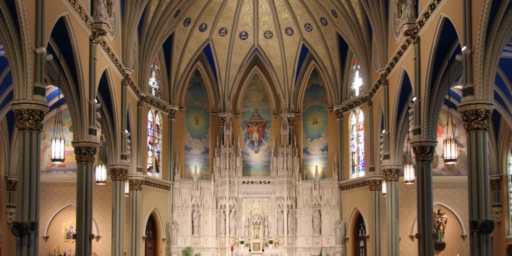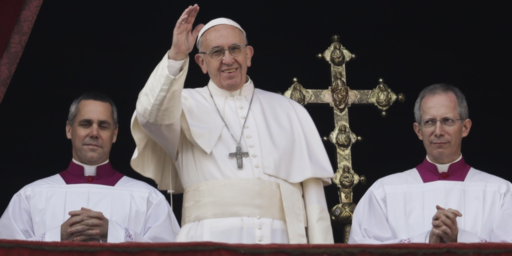Virginia Episcopalians in Revolt
Tensions in the American Episcopal Church are finally causing a long-anticipating schism, with several Virginia churches pulling out.
For about 30 years, the Episcopal Church has been one big unhappy family. Under one roof there were female bishops and male bishops who would not ordain women. There were parishes that celebrated gay weddings and parishes that denounced them; theologians sure that Jesus was the only route to salvation, and theologians who disagreed.
Now, after years of threats, the family is breaking up. As many as eight conservative Episcopal churches in Virginia are expected to announce today that their parishioners have voted to cut their ties with the Episcopal Church. Two are large, historic congregations that minister to the Washington elite and occupy real estate worth a combined $27 million, which could result in a legal battle over who keeps the property.
In a twist, these wealthy American congregations are essentially putting themselves up for adoption by Anglican archbishops in poorer dioceses in Africa, Asia and Latin America who share conservative theological views about homosexuality and the interpretation of Scripture with the breakaway Americans.
[…]
Together, these Americans and their overseas allies say they intend to form a new American branch that would rival or even supplant the Episcopal Church in the worldwide Anglican Communion, a confederation of national churches that trace their roots to the Church of England and the archbishop of Canterbury.
The idea of the congregations in an Episcopal church revolting against their bishop is quite bizarre. After all, the belief apostolic succession of the bishops is a defining tenant of what it means to be Episcopal; indeed, that’s what the name means.
Still, there’s no doubt that the church has become virtually nihilistic. Episcopalians openly joke about the fact that they don’t really believe in much of anything. It has become very much a priesthood of all believers, with a total rejection of a unified, hierarchical doctrine.
I’m surprised, frankly, that it has taken people this long to get sick of that. A central reason people attend church to begin with is to be part of something bigger than themselves to create a sense of order. If you’re going to be left to your own conscience to determine your own private morality, you might as well just be a free agent and keep the tithe.





James; AMEN to that!!
The disagreements still dwindle next to the agreements. Relatedly, I take odds with your characterization of the church as nihilistic. The inerrantism undergirding the schism is of recent vintage; historically, I think the US dioceses are on better footing. (especially since episcopalians have always been more defined by their liturgy than their theology).
Sounds like the contemporary Anglican church in the UK, which seems to stand for whatever makes people feel good about themselves, as long as it doesn’t offend anyone else.
I have been part of the Episcopal Church for over twenty years and have watched as it has gradually walked away from every thing that it once stood for. Church positions are supposed to be based on three things: Holy Scripture, tradition, and reason. Accelerating over the last years, the Church has all but abandoned the first two in an attempt to “broaden” its appeal to those who felt left out because their life choices (read that as “sin”) made them feel uncomfortable. Now all are welcome and there is no reason to ever believe that you should repent.
Traditional Episcopalians now have to deal with a Presiding Bishop whose primary qualification was that she was less radical than other candidates the progressive bishops were trying to force on us. She has only been a priest for 12 years, but now is the leader of the church. It is a disaster. No wonder the Virginia churches have finally decided to leave.
Breaking away is what Protestants do best, and is probably beneficial for those who break away & those who stay behind.
This is hardly the first schism in the Episcopal church.
It happens, and frankly it hasn’t ever bothered me much, but then I am a Baptist-which doesn’t have any presiding Bishop or governing body-each church is organized and run at the local level.
I do think that churches need to hold true to their core beliefs, and if the core beliefs of the break away churches are more in line with other branches, then I see nothing wrong with them choosing to aline with them.
The issue of property will be interesting and certainly will probably be in some kind of dispute.
As a Lutheran, we have some experience in breaking away from a large organized religion based on doctrinal differences. Of course, most of our experience involved raising an army to defend the new church.
It is sad when there is division in the church, but if you read Paul’s letters, such division has been going on for nearly a couple of thousand years.
You a Lutheran, YAJ? Me too! ELCA, as you’d expect.
I might add that it would be very strange if, having founded itself upon a disregard for a Scriptural prohibition expressly reaffirmed in the Gospels (see “divorce”) … the Episcopalian Church then became hyper-scrupulous on the subject of homosexuality, a practice which Jesus never mentions, however much it seems to have attracted Paul’s attention.
James, I’m glad you steered clear from the obvious headline: The
PeasantsEpiscopalians Are Revolting. Feel free to use it.YAJ and Anderson:
Here is YALutheran. ELCA as well.
I suspect these warring factions will “lawyer up” over the valuable church property. The ensuing litigation will not be attractive, will cost a lot, and will take a long time to resolve unless cooler heads prevail.
Anderson; Joshua 1:8 “This book of the law shall not depart out of thy mouth; but thou shalt meditate therein day and night, that thou mayest observe to do according to all that is written therein: for then thou shalt make thy way prosperous, and then thou shalt have good success.”Romans 13:8 “Owe no man any thing, but to love one another:for he that loveth another hath fulfilled the law.” Matthew 5:17-18 “Think not that I am come to destroy the law, or the prophets: I am not come to destroy, but to fulfill.For verily I say unto you, Till heaven and earth pass, one jot or one tittle shall in no wise pass from the law, till all be fulfilled.”…Grace and forgiveness is available to all who repent and accept His sacrifice; not to those who go whoreing after false doctrines.Jesus came to break the power of sin over mankind, not to glorify the very sin that condemned them in the first place.
Right, Floyd. And yet, the Episcopalians, like virtually every Protestant denomination, allow divorce. And yet I don’t see the Very Rev. Fred Phelps waving “God Hates Divorcees” signs.
vnjagvet and Anderson,
I’m Missouri Synod so we could probably pick nits within the Lutheran doctrines. Did you come from the ALC or the LCA side (or more recent after the merger)? The Lutherans certainly have a pretty wide spectrum itself from Wisconsin Synod to Missouri Synod to ELCA.
floyd,
I think you have it right. There are a lot of things I would like to do in my flesh, that doesn’t mean I should do them, that if I sin in doing them that I’m not covered by grace or that my temptation makes me less of a Christian. Each of us has one or more chinks in our armor that makes it harder for us in sanctification. What would make me stumble might not even get you to pause. Just because we really have difficulty with something and really wish God hadn’t prohibited it doesn’t mean we get to be the judge and decide it is no longer a sin.
Guess there is just never enough hatred in some religions to keep the parishioners foaming at the mouth!